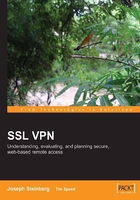
Chapter 2. SSL VPN: The Business Case
As alluded to in Chapter 1, the need to provide remote access to important electronic resources such as applications, files, and databases is not new. For several decades, businesses, governments, and organizations have realized that significant benefits could be achieved by delivering such access to various parties. These benefits include:
- Improving work force productivity:
- Employees and contractors can perform tasks even when not physically present in their usual work facilities.
- People are often willing to work more hours if they are permitted to work from home.
- Managers and administrators can respond faster to emergency conditions and may be willing to respond to less-critical events immediately rather than applying an "it can wait until tomorrow" attitude as they would if they had to return to work after retiring home at the conclusion of normal business hours.
- Lowering costs:
- Increased self-service capabilities for conducting business with outside parties such as suppliers and customers leads to lowers costs
- In some business environments in which employees can work remotely on a regular basis (e.g., IT consulting), an organization that offers remote access can maintain less office space (and save money). Workspaces can be assigned to those employees actually in the facility on a particular day (for example, by implementing a 'hoteling' scheme).
- Increased self-service capabilities for suppliers improve their efficiency, yielding better-negotiated service/product rates.
- If remote access is used as part of business-continuity strategy, fewer seats may be necessary at disaster-recovery/business-continuity facilities than if all workers must work at the secondary site.
Note
Hoteling refers to an office management technique that involves allocating office space to a particular individual for the time he or she actually plans to be in the office. Typically, workers notify an administrator (or use an automated reservation system to specify) as to which dates they plan to be in the office, and space is allocated to them for that time period.
Since some percentage of users are not in the office on any given day, the organization need not incur the costs of renting and maintaining enough space to simultaneously accommodate the workspace requirements of every employee.
- Increases top-line revenue:
- Employees who bill customers for their time (for example, attorneys, accountants, consultants) may generate more billable hours if they can work some of those hours from home.
- Increased self-service capabilities for prospects and customers will attract new customers.
- Assurance of business continuity:
- Users can work remotely in case of a disaster.
- Even non-critical employees who may not have workspaces at a recovery facility can be productive.